How To Discipline A Dog AFTER Fighting?
Aww, did your dog recently get into a skirmish with another dog? Don’t worry, doggy squabbles are common, and the vast majority of the time they simply snap and snarl and each other with fearsome growling, but they don’t actually hurt each other.
However, if the fight seems to be getting serious and neither dog is backing down, you might want to step in (CAREFULLY!) and break up the fight.
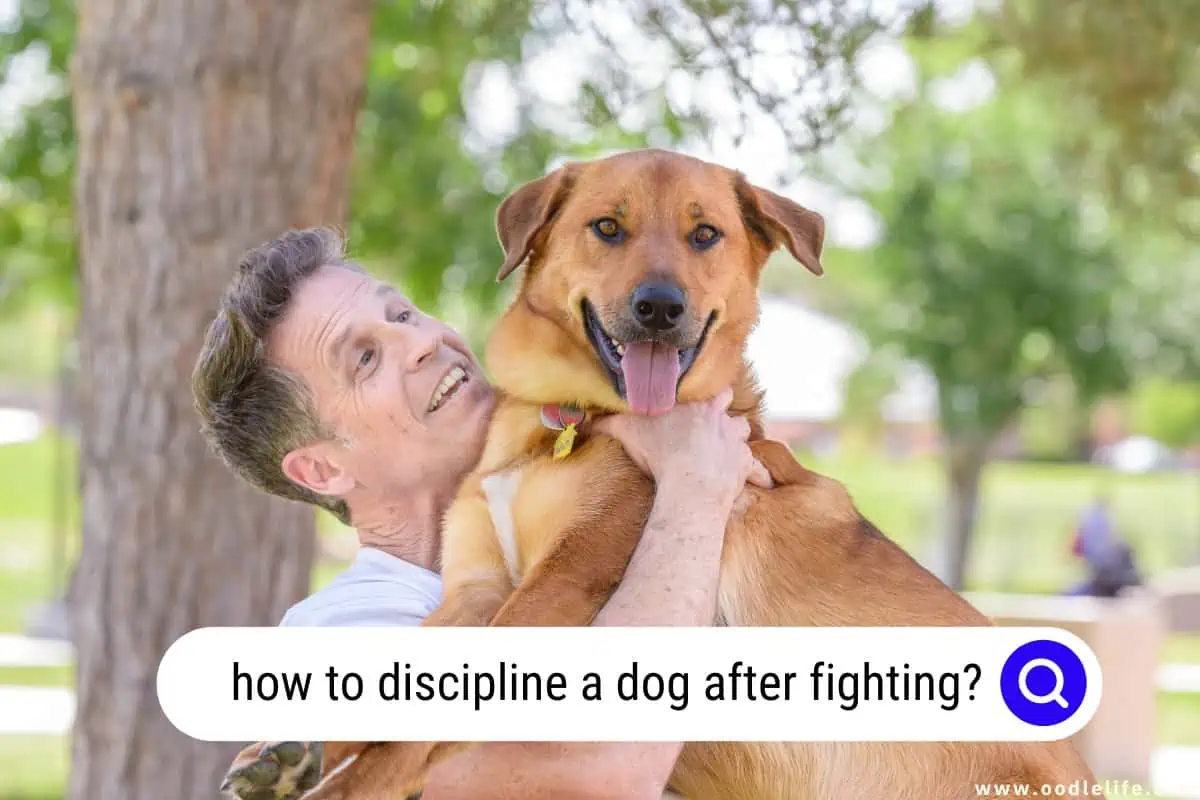
After the dust settles everyone has a chance to breathe easier again, what do you do now? Do you correct your dog, shout, or punish? Or do you simply ignore the little altercation and go about your day?
In this dog post, we’ll look at why dogs fight and how you should handle the situation.
Why Dogs Fight?
Some snapping and growling are normal in the life of a dog. While it might not escalate to a full-blown fight, baring teeth, growling, or a stiff body posture are all ways that dogs try to assert their dominance.
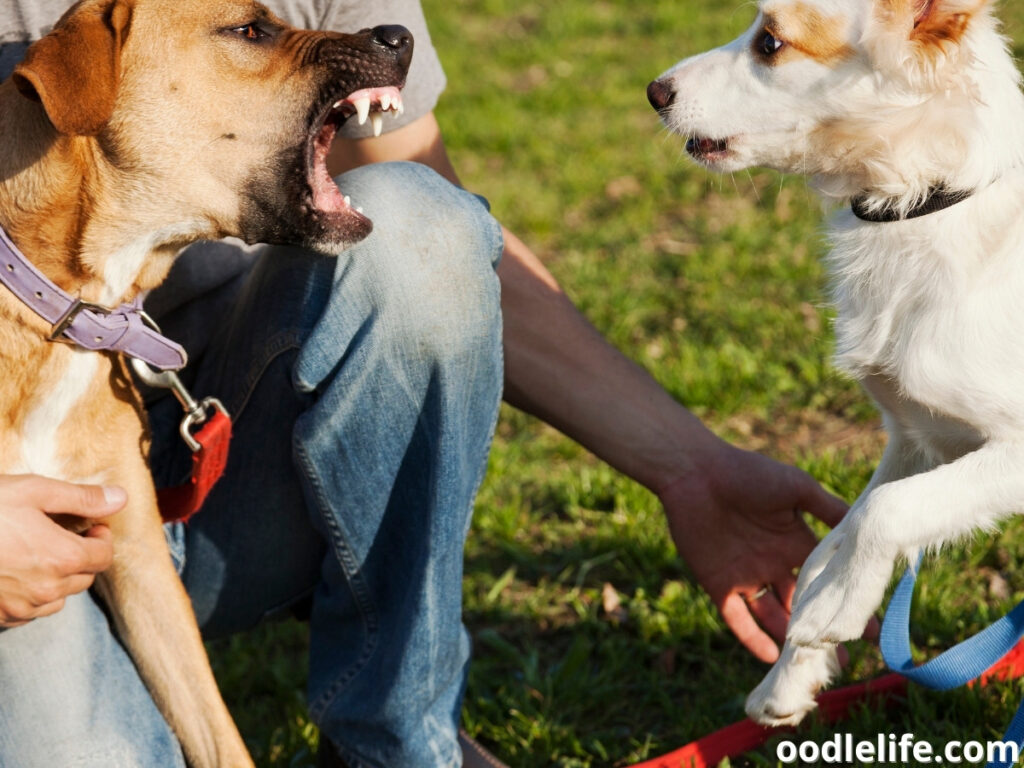
A dominant dog might seem to act aggressively, but all it is doing is trying to tell another dog “I’m higher up on the ranking charts”.
If the submissive dog agrees and shows behavior like lowering its head, laying its ears flat against its head, or lying down, the dominant dog is likely to simply walk away. However, the problem usually starts when there are two dominant dogs around, neither of which wants to “cry uncle”.
Let’s take a look at some of the primary reasons why dogs may enter into a conflict with one another.
1. Territorial Behavior
Dogs, like many other animals, are territorial creatures by nature. This means that they will guard their “territory” from others and will not hesitate to defend it if necessary. This instinct is especially strong when it comes to protecting their owners or family members, as well as defending their food or toys from an intruder.
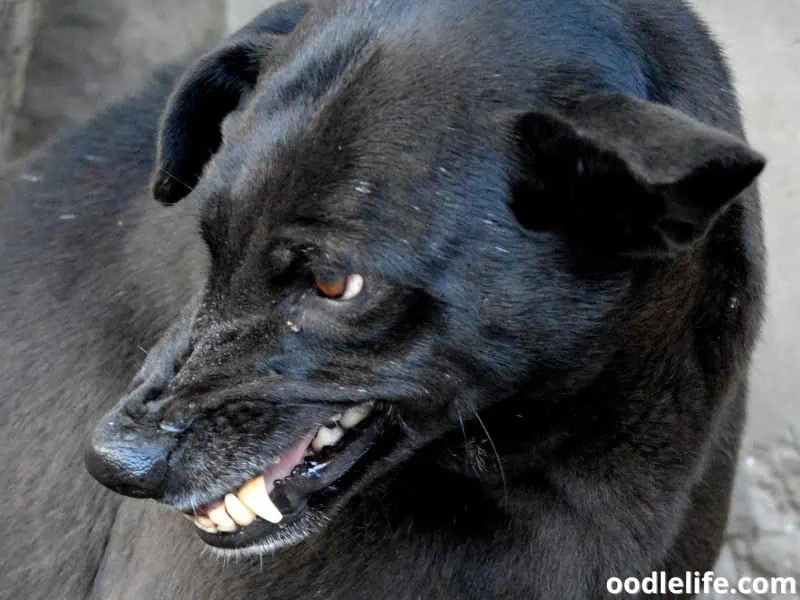
2. Dominance Issues
In addition to territorial behavior, dominance issues can also cause two dogs to engage in a physical altercation. If there is an imbalance in the power dynamic between two canine friends, it can lead to conflicts as one dog attempts to assert its authority over the other.
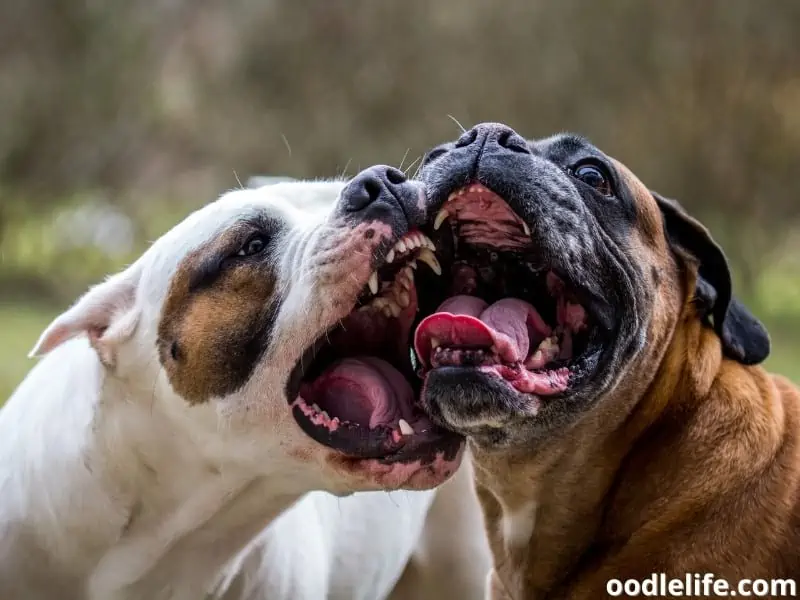
In many cases, these scuffles are relatively minor and will not even draw blood or cause some missing fur. However, if left unchecked and unresolved, it can eventually lead to more serious fights between the two dogs in question.
3. Fear Aggression
Fear aggression is quite common among dogs and occurs when an animal feels threatened by its environment or someone—or something—in it.
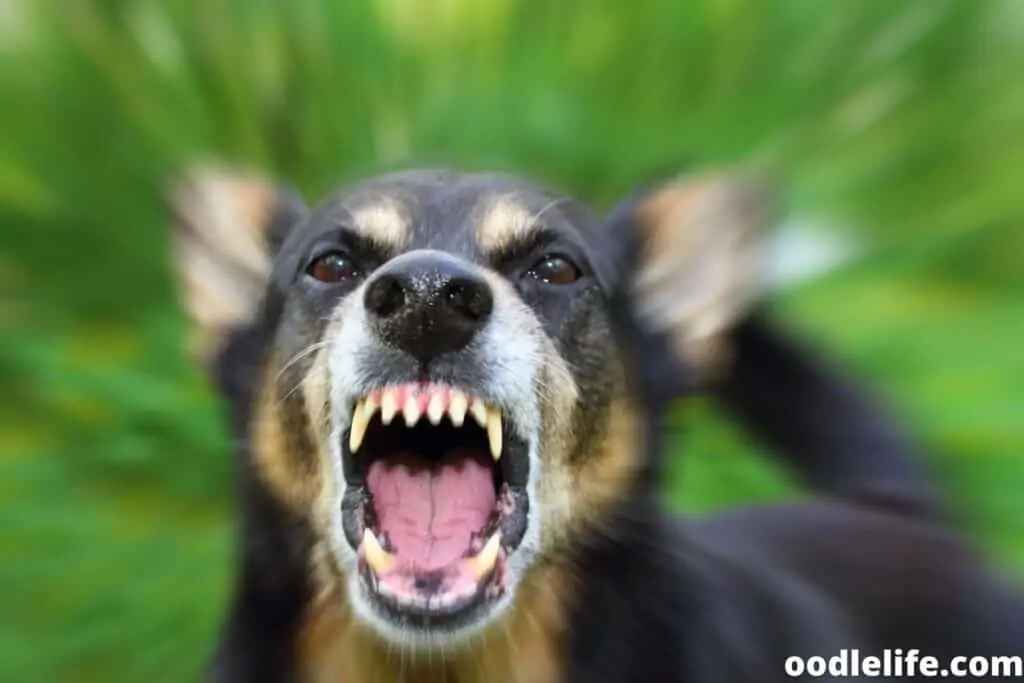
While fear aggression typically manifests itself as barking and growling, if left unchecked it can progress into physical confrontations with other pets or people nearby.
How To Discipline Your Dog After A Dog Fight?
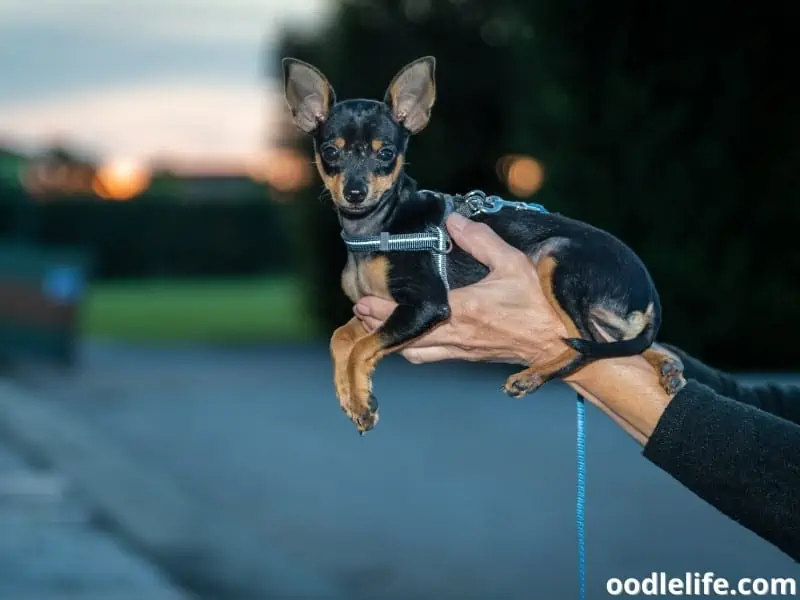
- If your dog is fighting with another dog, remove your pet from the situation immediately. Dogs are naturally social animals and they need to learn how to interact with other dogs.
- Unfortunately, this sometimes causes fights with other animals or amongst themselves. If you’re ever in a situation like this, take your dog to a safe place.
- Once there in a safe place, both of you should take some time and calm down. If you’re angry then you will only worsen the situation so it is important to not panic or project anger.
- Assess the situation and figure out the reason for the fight, then you will be able to handle the situation correctly. For example, if they are fighting over a toy, you should take that toy away.
- Don’t use harsh corrections or punishments. Simply correct your dog verbally with a firm “No” and stay away from the other dog for now.
- If you are home, put them in a time-out in a designated area, such as their crate or another room. This will help them calm down and reset.
- Provide positive reinforcement and reward when they show good behavior. This will enforce desired behavior from them and help prevent fights in the future.
- Show patience and consistency. It will take time to disciple your dog and won’t happen overnight.
- If the fight is not too serious then immediately get both dogs to lie down and become calm where the fight happened. Treat and praise them lavishly if they are nice and relaxed near each other.
- Dogs don’t have the memory we do, nor are they prone to holding grudges. Two dogs that recently got into a minor skirmish are often seen hanging out as friends just minutes later.
- Try walking both dogs together after they’ve calmed down as long as you can. Dogs live in the moment and fight like kids, getting over fights quickly and moving on to the fun stuff.
- Don’t isolate them from each other, as they can get stuck in a certain mentality which might escalate into yet more aggression.
- Of course, check the dogs to see if they have any injuries like some torn skin or minor scrapes and cuts. The huge majority of doggy squabbles end without any damage at all, but in some cases, there might be a few cuts and scrapes that need to be treated with some antiseptic.
- If the fighting grows more severe and escalates into frequent injuries like deep cuts and lacerations or worse, you might have to seek the help of a qualified behaviorist or trainer. Deep wounds usually mean that the conflict has already gotten out of hand.
What Not To Do After a Dog Fight?
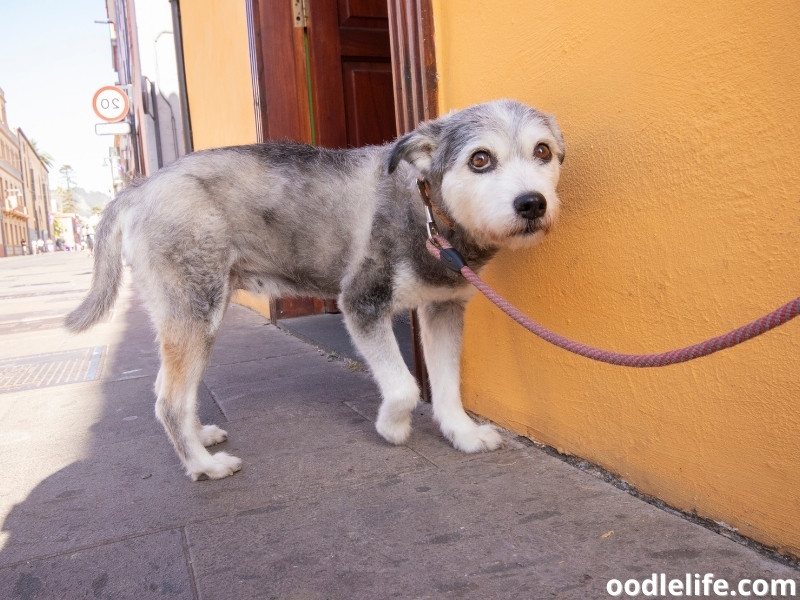
- Do not physically punish your dog or use any aversive methods. Instead, evaluate the situation to find out the reason why it happened and start training. Find the underlying behavioral issue.
- Don’t let your guard down after a fight.
- Don’t yell at your dog as this may cause them to start fearing you instead and worsen the behavior issues.
- Don’t panic.
Verbal Correction
Verbal correction is when you use a combination of a word and tone or voice inflection to show your dog that he is doing something wrong. Your tone and the words you use will need to be associated properly beforehand. Otherwise, your dog won’t understand that you’re not happy and could be confused.
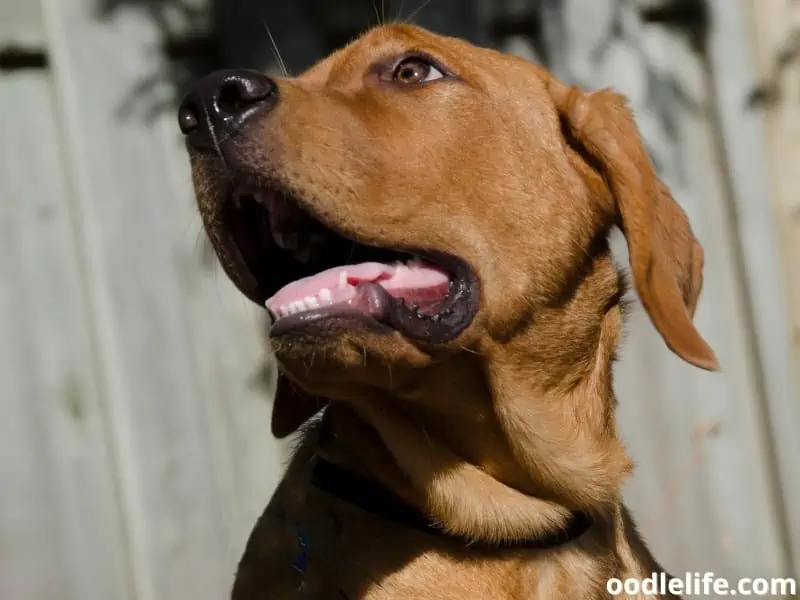
If you catch your dog red-handed about to start a fight, a well-timed correction may be able to stop a fight from even starting but if the other dog is the aggressor then it’s unlikely.
If YOUR dog is the aggressor, you might be able to prevent a fight by issuing a verbal correction and simply walking away from the other dog and isolating your dog for a while to help him or her calm down.
It is important to be aware of the subtle signs your dog may exhibit that indicate that it is about to attack. This could include such things as baring teeth and growling, showing general aggressive body language such as pinning back ears and curling its upper lip, an overall stiffening of the posture, or a tense feeling radiating from the dog.
It is also possible for some hints of nervousness to be present, including excessive lip licking or trying to pull away from whatever they perceive as a threat. If any of these signs are present it is best to change the direction of your walk or remove your dog from the situation entirely.
Why You Shouldn’t Punish Your Dog?
If you want to correct your dog, you’ll need to time it perfectly. Dogs have incredibly short memories and tend to move on quickly, so if you want even 10 seconds after a fight to deliver a correction, or worse, a punishment, your dog might be confused as to what he did wrong.
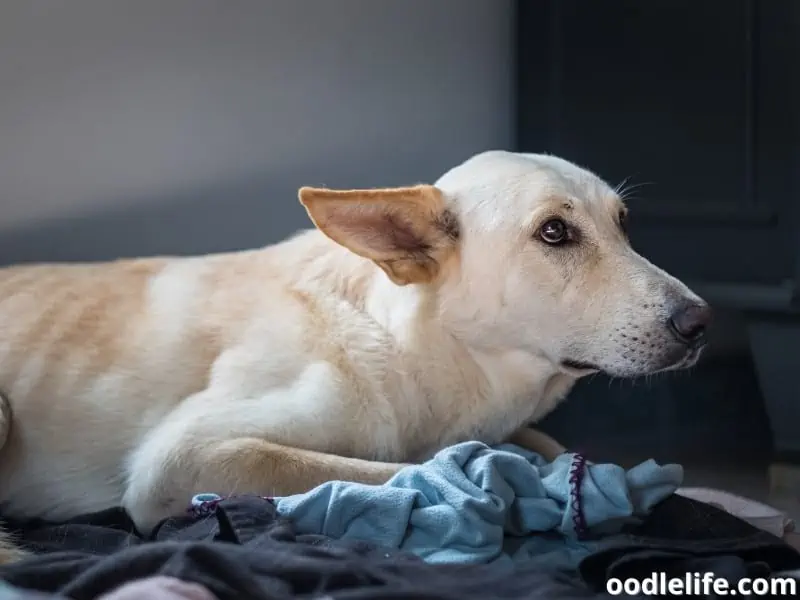
Unfortunately, many people opt for punishments when trying to address these behaviors. Punishing your dog is not only ineffective but can be incredibly damaging as well. Dogs do not understand the concept of punishment; all they experience is fear and confusion when being yelled at or hit.
This can lead to aggressive behavior and make it virtually impossible for you to form a bond with them. Such negative reactions to punishment also discourage dogs from learning new behaviors; even if they do learn something new, it’s usually through fear rather than understanding or trust.
Instead of punishing your pup for bad behavior, try rewarding him for good behavior instead with positive reinforcement. When your dog is calmer, you can bring the two fighting dogs back together again. Have someone help you, and be sure to keep the dogs apart and only move closer when they are nice and calm.
Keep rewarding with treats and praise when the dogs are well-behaved towards each other. However, as calm and relaxed as they may be, you might want to keep them on a leash and have someone help you. The last thing you want is another skirmish that can escalate into a full-blown fight.
Final Thoughts
It is important to note that no matter how hard you try, certain dogs simply will never get along with each other.
Avoiding some posturing and aggressive body language might be challenging in this situation, but you can certainly make serious physical altercations a strict no-no. Good luck!